What are the best poems for kids to memorize? Read on to discover poems every child (and adult) should know by heart!
You want to include poetry memorization in your daily life, but you’re not sure where to start.
You want to have your children’s hearts filled with melodious words and profound thoughts, but you don’t know how to pick a poem and begin.
There are the 12 poems I think everyone – child and adult – should know by heart!
Know by Heart…not just memorize
Why do I say, “know by heart,” and not merely “memorize”?
Because one can regurgitate words without having them sink into one’s soul.
Knowing a poem intimately causes one to think on it deeply, love it well, and carry it with you always.
12 Poems Every Child and Adult Should Know…really?
Who died and made me queen?
Obviously, these are not the Best Poems of All Time.
(Necessarily. I mean, frankly, I might fight a duel with you over some of them.)
But they are some of my favorites. They are poems my children and I have known and memorized and loved in our own home. And they run the gamut of human experience.
Consider them a starting point. Feel free to choose your own poems, or despise my list entirely.
(Um, but seriously now. Getting rid of Homer? Chaucer? Tennyson? Uh. Yeah. Let’s have that duel.)
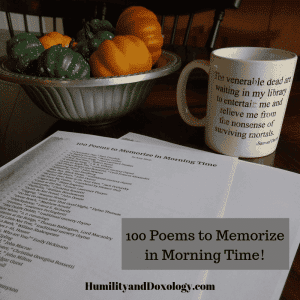
Poems are not all the same
Some poems are silly. Some are full of longing. Some are filled with love. Some are despairing.
Some are easy, some are hard.
Some might even be a little bit disturbing.
But you do not know all the heights and depths to which you or your children will be called. You do not know when they may need to cheer up a downcast heart or persevere through a trial. Fill their hearts… fill your heart… with the lyrical words of beauty found in good poetry!

{This post contains affiliate links. Please see disclaimer.}
Start here, but don’t stop here…there are so many more poems to enjoy
Start with these poems for kids to memorize. Copy the one(s) you choose and use them for your Morning Time or memory work this year. Or join me on a Year of Memory Work: 52 weeks of free videos and printable resources!
But don’t stop here.
Not sure where to go next? Never run out of poems for kids to memorize with this list of 100 of the best poems to memorize in your home!
There are many more wonderful poems to read and love and listen to and secret away in the recesses of your heart. I have an Ultimate Poetry Book List just for you!
Are you ready?! Let’s go memorize some poems!!
12 Poems for Kids to Memorize
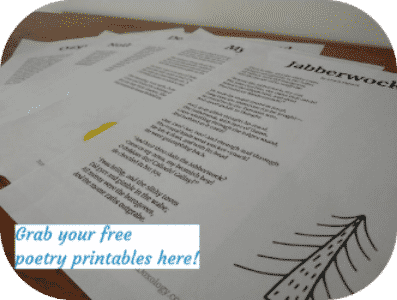
- “Nothing Gold Can Stay,” Robert Frost
- “Ozymandias,” Percy Bysshe Shelley
- “Charge of the Light Brigade,” Alfred, Lord Tennyson
- “Iliad” (opening lines), Homer
- “Jabberwocky,” Lewis Carroll
- “Death Be Not Proud,” John Donne
- Prologue to the Canterbury Tales, Geoffrey Chaucer
- “Casey at the Bat,” Ernest Lawrence Thayer
- “My Shadow,” Robert Louis Stevenson
- Psalm 139:1-13
- “Destruction of Sennacherib,” Lord Byron
- Sonnet 116, William Shakespeare
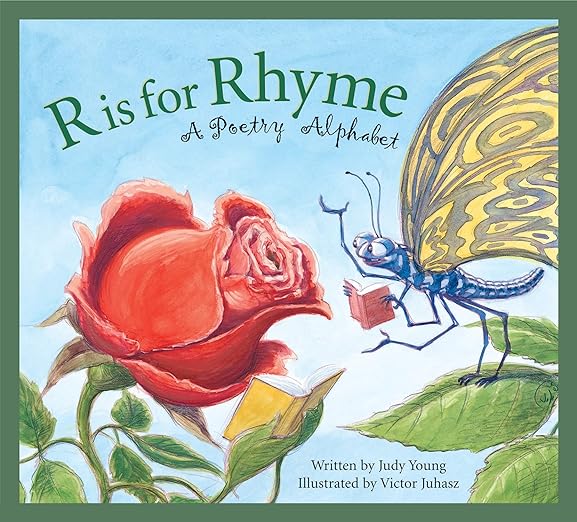

Nothing Gold Can Stay
by Robert Frost
Nature’s first green is gold,
Her hardest hue to hold.
Her early leaf’s a flower;
But only so an hour.
Then leaf subsides to leaf.
So Eden sank to grief,
So dawn goes down to day.
Nothing gold can stay.
Ozymandias
by Percy Bysshe Shelley
I met a traveller from an antique land,
Who said—“Two vast and trunkless legs of stone
Stand in the desert. . . . Near them, on the sand,
Half sunk a shattered visage lies, whose frown,
And wrinkled lip, and sneer of cold command,
Tell that its sculptor well those passions read
Which yet survive, stamped on these lifeless things,
The hand that mocked them, and the heart that fed;
And on the pedestal, these words appear:
My name is Ozymandias, King of Kings;
Look on my Works, ye Mighty, and despair!
Nothing beside remains. Round the decay
Of that colossal Wreck, boundless and bare
The lone and level sands stretch far away.”
The Charge of the Light Brigade
by Alfred, Lord Tennyson
I
Half a league, half a league,
Half a league onward,
All in the valley of Death
Rode the six hundred.
“Forward, the Light Brigade!
Charge for the guns!” he said.
Into the valley of Death
Rode the six hundred.
II
“Forward, the Light Brigade!”
Was there a man dismayed?
Not though the soldier knew
Someone had blundered.
Theirs not to make reply,
Theirs not to reason why,
Theirs but to do and die.
Into the valley of Death
Rode the six hundred.
III
Cannon to right of them,
Cannon to left of them,
Cannon in front of them
Volleyed and thundered;
Stormed at with shot and shell,
Boldly they rode and well,
Into the jaws of Death,
Into the mouth of hell
Rode the six hundred.
IV
Flashed all their sabres bare,
Flashed as they turned in air
Sabring the gunners there,
Charging an army, while
All the world wondered.
Plunged in the battery-smoke
Right through the line they broke;
Cossack and Russian
Reeled from the sabre stroke
Shattered and sundered.
Then they rode back, but not
Not the six hundred.
V
Cannon to right of them,
Cannon to left of them,
Cannon behind them
Volleyed and thundered;
Stormed at with shot and shell,
While horse and hero fell.
They that had fought so well
Came through the jaws of Death,
Back from the mouth of hell,
All that was left of them,
Left of six hundred.
VI
When can their glory fade?
O the wild charge they made!
All the world wondered.
Honour the charge they made!
Honour the Light Brigade,
Noble six hundred!
The Iliad
by Homer (translated by Robert Fitzgerald)
(Here are the first 6 lines to give you a taste. We have learned the first 16, found here. I love Fitzgerald’s translation of Homer!)
Anger be now your song, immortal one,
Akhilleus’ anger, doomed and ruinous,
that caused the Akhaians loss on bitter loss
and crowded brave souls into the undergloom,
leaving so many dead men–carrion
for dogs and birds; and the will of Zeus was done.
Jabberwocky
by Lewis Carroll
’Twas brillig, and the slithy toves
Did gyre and gimble in the wabe:
All mimsy were the borogoves,
And the mome raths outgrabe.
“Beware the Jabberwock, my son!
The jaws that bite, the claws that catch!
Beware the Jubjub bird, and shun
The frumious Bandersnatch!”
He took his vorpal sword in hand;
Long time the manxome foe he sought—
So rested he by the Tumtum tree
And stood awhile in thought.
And, as in uffish thought he stood,
The Jabberwock, with eyes of flame,
Came whiffling through the tulgey wood,
And burbled as it came!
One, two! One, two! And through and through
The vorpal blade went snicker-snack!
He left it dead, and with its head
He went galumphing back.
“And hast thou slain the Jabberwock?
Come to my arms, my beamish boy!
O frabjous day! Callooh! Callay!”
He chortled in his joy.
’Twas brillig, and the slithy toves
Did gyre and gimble in the wabe:
All mimsy were the borogoves,
And the mome raths outgrabe.
Death be not proud (Holy Sonnet 10)
John Donne
Death, be not proud, though some have called thee
Mighty and dreadful, for thou art not so;
For those whom thou think’st thou dost overthrow
Die not, poor Death, nor yet canst thou kill me.
From rest and sleep, which but thy pictures be,
Much pleasure; then from thee much more must flow,
And soonest our best men with thee do go,
Rest of their bones, and soul’s delivery.
Thou art slave to fate, chance, kings, and desperate men,
And dost with poison, war, and sickness dwell,
And poppy or charms can make us sleep as well
And better than thy stroke; why swell’st thou then?
One short sleep past, we wake eternally
And death shall be no more; Death, thou shalt die.
Prologue to the Canterbury Tales
Geoffrey Chaucer
Whan that Aprille with his shoures soote,
The droghte of March hath perced to the roote,
And bathed every veyne in swich licóur
Of which vertú engendred is the flour;
Whan Zephirus eek with his swete breeth
Inspired hath in every holt and heeth
The tendre croppes, and the yonge sonne
Hath in the Ram his halfe cours y-ronne,
And smale foweles maken melodye,
That slepen al the nyght with open ye,
So priketh hem Natúre in hir corages,
Thanne longen folk to goon on pilgrimages,
And palmeres for to seken straunge strondes,
To ferne halwes, kowthe in sondry londes;
And specially, from every shires ende
Of Engelond, to Caunterbury they wende,
The hooly blisful martir for to seke,
That hem hath holpen whan that they were seeke.
Casey at the Bat
Ernest Lawrence Thayer
The outlook wasn’t brilliant for the Mudville nine that day;
The score stood four to two with but one inning more to play.
And then when Cooney died at first, and Barrows did the same,
A sickly silence fell upon the patrons of the game.
A straggling few got up to go in deep despair. The rest
Clung to that hope which springs eternal in the human breast;
They thought if only Casey could but get a whack at that—
We’d put up even money now with Casey at the bat.
But Flynn preceded Casey, as did also Jimmy Blake,
And the former was a lulu and the latter was a cake;
So upon that stricken multitude grim melancholy sat,
For there seemed but little chance of Casey’s getting to the bat.
But Flynn let drive a single, to the wonderment of all,
And Blake, the much despised, tore the cover off the ball;
And when the dust had lifted, and men saw what had occurred,
There was Jimmy safe at second and Flynn a-hugging third.
Then from 5,000 throats and more there rose a lusty yell;
It rumbled through the valley, it rattled in the dell;
It knocked upon the mountain and recoiled upon the flat,
For Casey, mighty Casey, was advancing to the bat.
There was ease in Casey’s manner as he stepped into his place;
There was pride in Casey’s bearing and a smile on Casey’s face.
And when, responding to the cheers, he lightly doffed his hat,
No stranger in the crowd could doubt ’twas Casey at the bat.
Ten thousand eyes were on him as he rubbed his hands with dirt;
Five thousand tongues applauded when he wiped them on his shirt.
Then while the writhing pitcher ground the ball into his hip,
Defiance gleamed in Casey’s eye, a sneer curled Casey’s lip.
And now the leather-covered sphere came hurtling through the air,
And Casey stood a-watching it in haughty grandeur there.
Close by the sturdy batsman the ball unheeded sped—
“That ain’t my style,” said Casey. “Strike one,” the umpire said.
From the benches, black with people, there went up a muffled roar,
Like the beating of the storm-waves on a stern and distant shore.
“Kill him! Kill the umpire!” shouted some one on the stand;
And it’s likely they’d have killed him had not Casey raised his hand.
With a smile of Christian charity great Casey’s visage shone;
He stilled the rising tumult; he bade the game go on;
He signaled to the pitcher, and once more the spheroid flew;
But Casey still ignored it, and the umpire said, “Strike two.”
“Fraud!” cried the maddened thousands, and echo answered fraud;
But one scornful look from Casey and the audience was awed.
They saw his face grow stern and cold, they saw his muscles strain,
And they knew that Casey wouldn’t let that ball go by again.
The sneer is gone from Casey’s lip, his teeth are clinched in hate;
He pounds with cruel violence his bat upon the plate.
And now the pitcher holds the ball, and now he lets it go,
And now the air is shattered by the force of Casey’s blow.
Oh, somewhere in this favored land the sun is shining bright;
The band is playing somewhere, and somewhere hearts are light,
And somewhere men are laughing, and somewhere children shout;
But there is no joy in Mudville—mighty Casey has struck out.
My Shadow
Robert Louis Stevenson
I have a little shadow that goes in and out with me,
And what can be the use of him is more than I can see.
He is very, very like me from the heels up to the head;
And I see him jump before me, when I jump into my bed.
The funniest thing about him is the way he likes to grow—
Not at all like proper children, which is always very slow;
For he sometimes shoots up taller like an india-rubber ball,
And he sometimes gets so little that there’s none of him at all.
He hasn’t got a notion of how children ought to play,
And can only make a fool of me in every sort of way.
He stays so close beside me, he’s a coward you can see;
I’d think shame to stick to nursie as that shadow sticks to me!
One morning, very early, before the sun was up,
I rose and found the shining dew on every buttercup;
But my lazy little shadow, like an arrant sleepy-head,
Had stayed at home behind me and was fast asleep in bed.
Psalm 139:1-13
O Lord, You have searched me and known me.
You know when I sit down and when I rise up;
You understand my thought from afar.
You scrutinize my path and my lying down,
And are intimately acquainted with all my ways.
Even before there is a word on my tongue,
Behold, O Lord, You know it all.
You have enclosed me behind and before,
And laid Your hand upon me.
Such knowledge is too wonderful for me;
It is too high, I cannot attain to it.
Where can I go from Your Spirit?
Or where can I flee from Your presence?
If I ascend to heaven, You are there;
If I make my bed in Sheol, behold, You are there.
If I take the wings of the dawn,
If I dwell in the remotest part of the sea,
Even there Your hand will lead me,
And Your right hand will lay hold of me.
If I say, “Surely the darkness will overwhelm me,
And the light around me will be night,”
Even the darkness is not dark to You,
And the night is as bright as the day.
Darkness and light are alike to You.
For You formed my inward parts;
You wove me in my mother’s womb.
The Destruction Of Sennacherib
Lord Byron
The Assyrian came down like the wolf on the fold,
And his cohorts were gleaming in purple and gold;
And the sheen of their spears was like stars on the sea,
When the blue wave rolls nightly on deep Galilee.
Like the leaves of the forest when Summer is green,
That host with their banners at sunset were seen:
Like the leaves of the forest when Autumn hath blown,
That host on the morrow lay withered and strown.
For the Angel of Death spread his wings on the blast,
And breathed in the face of the foe as he passed;
And the eyes of the sleepers waxed deadly and chill,
And their hearts but once heaved, and for ever grew still!
And there lay the steed with his nostril all wide,
But through it there rolled not the breath of his pride;
And the foam of his gasping lay white on the turf,
And cold as the spray of the rock-beating surf.
And there lay the rider distorted and pale,
With the dew on his brow, and the rust on his mail:
And the tents were all silent, the banners alone,
The lances unlifted, the trumpet unblown.
And the widows of Ashur are loud in their wail,
And the idols are broke in the temple of Baal;
And the might of the Gentile, unsmote by the sword,
Hath melted like snow in the glance of the Lord!
Sonnet 116
William Shakespeare
Let me not to the marriage of true minds
Admit impediments. Love is not love
Which alters when it alteration finds,
Or bends with the remover to remove.
O no! it is an ever-fixed mark
That looks on tempests and is never shaken;
It is the star to every wand’ring bark,
Whose worth’s unknown, although his height be taken.
Love’s not Time’s fool, though rosy lips and cheeks
Within his bending sickle’s compass come;
Love alters not with his brief hours and weeks,
But bears it out even to the edge of doom.
If this be error and upon me prov’d,
I never writ, nor no man ever lov’d.

What poems do you know by heart? Do you include poetry memorization in your daily life?
I would love to hear from you! Come and join the conversation on Facebook or Instagram and tell me your favorite poems for kids to memorize, and make sure you sign up for my email list!
Want more poems for kids to memorize? Check out these other great poetry resources
- The Year of Memory Work (52 weeks of video recitations and printables…FREE)
- National Poetry Month resources
- Poem in Your Pocket Day (plus free printables)
- Exploring Shakespeare with Children
- Ultimate Poetry Book List
- Never run out of poems for kids to memorize: 100 Poems to Memorize in Morning Time
- How to Choose the Best Memory Work
- Can you Haiku?
- Poetry Free Writing
- What is Morning Time?
- Facebook Live sharing 4 new poetry books I’m excited about
- YouTube playlist of my Year of Memory Work recitations
Want to listen in on a conversation my daughter and I had about poetry?
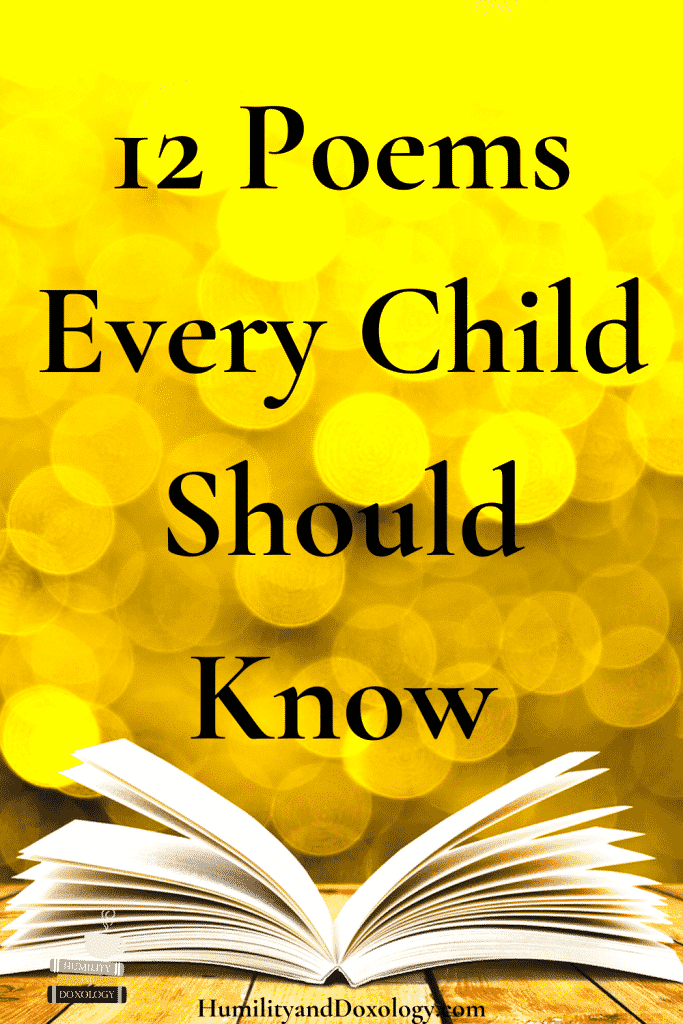
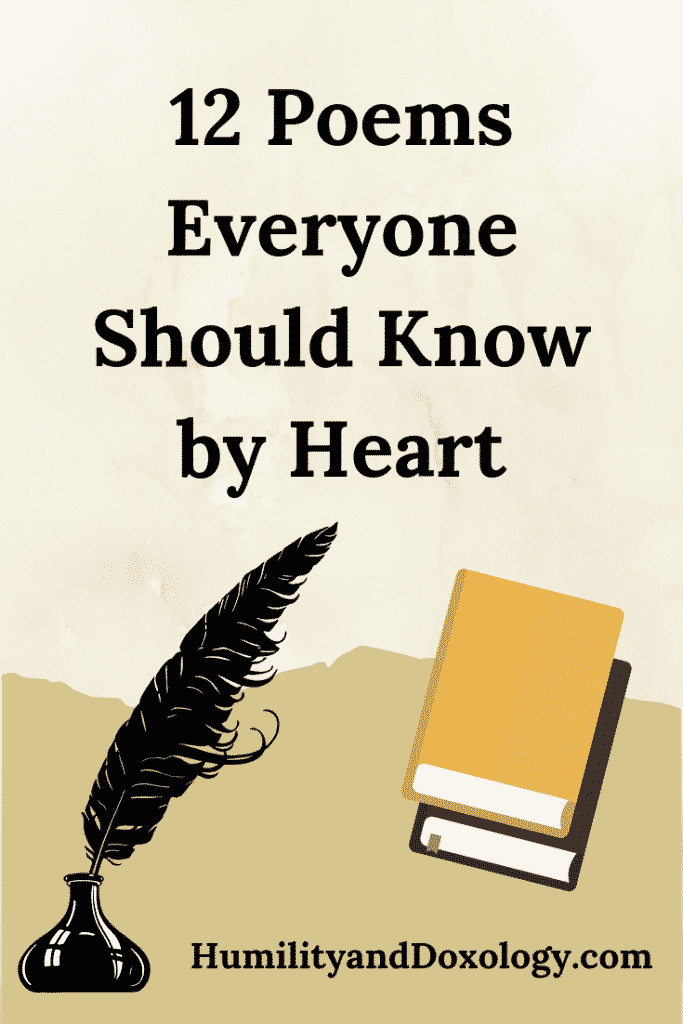

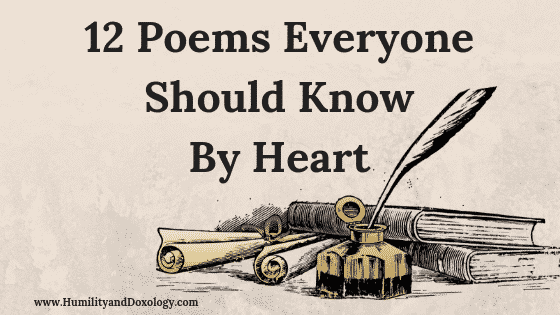

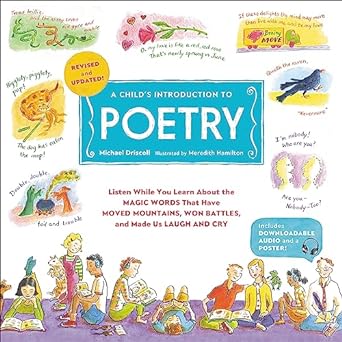





Pingback: Making Morning Time Work for You | Homeschooling without Training Wheels
Pingback: How We Homeschool Preschool – Humility and Doxology
Pingback: Happy 1 Year Blogiversary – Humility and Doxology
Pingback: Ultimate Poetry Book List for Tots to Teens (and Their Adults) – Humility and Doxology
Pingback: Poetry: Emotions, Thoughts, and the Best-Ordered Words – Humility and Doxology
Pingback: Poem in your Pocket Day: Free Printables – Humility and Doxology
Pingback: Do You Know About These Poetry Books? – Humility and Doxology
Pingback: Playing with Words: Poetry Free Writing – Humility and Doxology
I think “If” by Rudyard Kipling, The 23rd Psalm, and Shakespeare’s Sonnets 29 and 18 should definitely make the list!
Oh these are wonderful selections as well! In fact, “If” is one of the pieces we include in our Year of Memory Work, a year’s worth of free printable poems and video recitations. You can see my son recite “If” for the Year of Memory Work here. Psalm 23 is one of the 100 poems I included this list of 100 Best Poems to Memorize in Morning Time.
Every other month we focus on Shakespeare for our Morning Time memory work. You’re making me want to do a sonnet month this February and include #29 and #18! So much delightful Shakespeare to read and recite, so little time. 🙂
Thanks for this list! I memorized poems as a college student and (decades later) I’ve decided to memorize more, which is how I found myself here.
When I was growing up, we were given lists like these, and as a girl, what it taught me was that men write and women do not. Or that men have written what’s deemed best, and women have not. The notion that, historically, boys have had access to a more rigorous education than girls, and that publishers throughout time have favored males over females was never even discussed. I thank you for this post, but why not add at least a few poems by women? Why not show boys and girls that they are all capable of greatness? Again, thank you.
Thank you so much for your comment and for sharing your perspective! On my more extensive list of 100 Best Poems to Memorize I do include several poems by poets who are women. Poets like Sara Teasdale, Lucille Clifton, Elizabeth Barrett Browning, Christina Georgina Rosetti, and more are an absolute delight to enjoy!
I do like all your poems, but is looking for an old English poem about the maidens cleanning the milkroom, for if its not clean, the fairies will make the milk sour.
I love this!
Tennyson’s « Ulysses. » I had it memorized by the third time I read it, in middle school. It was so wonderful!
I love that you made a list of items for children. It’s difficult to choose only twelve. I would add Psalm 23 and Invictis! Thanks for this blog.
The Highwayman by Alfred Noyes, Patterns by Amy Lowell and The Swing by Robert Louis Stevenson……three of my favorites!
I love 2 of the ones you mention, but am unfamiliar with “Patterns.” I will go check that one out right now! Thanks for the suggestion. 🙂